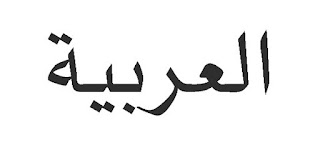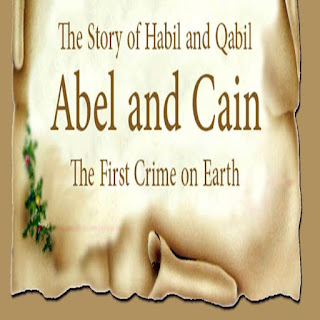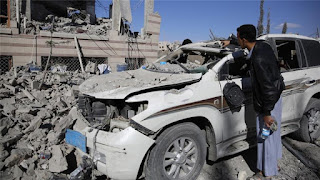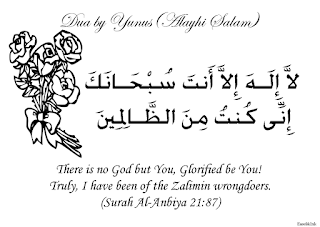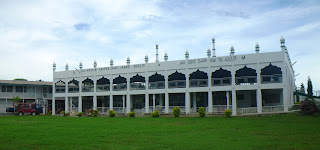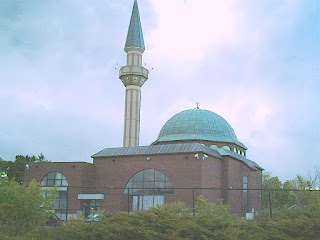When the two armies faced each other, Goliath challenged any soldier from King Saul's army to single combat, as was the custom of battle in those days. Goliath also wanted to show off his strength. The men were terrorized, and no one had enough courage to volunteer. The king offered the hand of his pretty daughter in marriage to the man who would fight Goliath, but even this tempting offer did not change the deadly silence among his soldiers.
Then, to everyone's surprise, a youth stepped forward. A roar of laughter echoed from the enemy's side, and even Saul's men shook their heads.
The young man was David (Dawud), from the city of Bethlehem. His elderly father had chosen three of his sons to join Saul's army. He had instructed the youngest one, David, not to take part in the fighting but to help the army in other ways and to report to his father daily on what was happening on the war front.
Although Saul was very impressed by the youth's courage, he said: "I admire your courage, but you are no match for that mighty warrior. Let the strong men come forward." David, however, had already decided and was willing to meet the challenge. Proudly, he told the king that only the day before he had killed a lion which had threatened his father's sheep, and on another occasion he had killed a bear. He asked Saul not to judge him by his appearance, for he feared no man or wild beast. Saul, surprised by young David's brave stance, agreed: "My brave soldier, if you are willing, then may Allah guard you and grant you strength!"
The king dressed David in battle armor and handed him a sword, but David was not used to wearing battle dress. He felt uncomfortable in it, and it obstructed his movements. He removed the armor, then collected a few pebbles and filled his leather pouch with them. He slung it over his shoulder next to his sling. With his wooden staff in hand, he began to walk towards the enemy. Saul was worried and asked him how on earth, with a sling and a couple of stones was he going to defend himself against the giant? David replied: "Allah Who protected me from the claws of the bear and the fangs of the lion will certainly protect me from this brute!"
When Goliath set eyes on the lean young man who looked like a boy, he laughed loudly and roared: "Are you out to play war with one of your playmates, or are you tired of your life? I will simply cut off your head with one swipe of my sword!"
David shouted back: "You may have armor, shield, and sword, but I face you in the name of Allah, the Lord of the Israelites, Whose laws you have mocked. Today you will see that it is not the sword that kills but the will and power of Allah!"
So saying, he took his sling and placed in it a pebble from his pouch. He swung and aimed it at Goliath. The pebble shot from the whirling sling with the speed of an arrow and hit Goliath's head with great force. Blood gushed out, and Goliath thumped to the ground, lifeless, before he had a chance to draw his sword. When the rest of his men saw their mighty hero slain, they took to their heels. The Israelites followed in hot pursuit, taking revenge for their years of suffering at the hands of their enemy, killing every soldier they could lay hands on. In this battle the Israelites regained the glory and honor that had been lost for a long time.
David became a hero overnight. Saul kept his word and married his daughter Michal (Miqel) to the young warrior and took him under his wing as one of his chief advisors.
Almighty Allah declared: So they routed them by Allah's Leave and David killed Goliath, and Allah gave him (David) the kingdom (after the death of Saul and Samuel) and wisdom, and taught him of that which He willed. And if Allah did not check one set of people by means of another, the earth would indeed be full of mischief. But Allah is full of Bounty to the Alamin (mankind, jinns and all that exist). (Ch 2:251 Quran).
David became the most famous man among the Israelites. However, he was not inveigled by this; he was not a prisoner of fame or leadership but a prisoner of Allah's love.
Therefore, after killing Goliath he went out into the desert in the company of nature, glorifying Almighty Allah and contemplating His favors. Verily, We made the mountains to glorify Our Praises with him (David) in the Ashi (after the mid-day till sunset) and Ishraq (after the sunrise till mid-day). And (so did) the birds assembled: all with him (David) did turn (to Allah, glorified His Praises). We made his kingdom strong and gave him wisdom and sound judgment in speech and decision. (Ch 38:18-20 Quran)
Creatures such as the plants, birds, beasts, and even the mountains responded to his voice glorifying Allah. Allah had chosen David to be a prophet and revealed the Psalms to him. As He the Almighty said: And to David We gave the Psalms. (Ch 17:55 Quran).
David recited his scripture and glorified Allah while the mountains joined him praise and the birds rallied around him. Almighty Allah directed: Be patient (O Muhammad) of what they say, and remember Our slave David, endured with power. Verily, he was ever oft-returning in all matters and in repentance toward Allah. (Ch 38:17 Quran).
David's sincerity was not the only factor responsible for the birds and beasts joining with him in glorifying Allah, nor was the sweetness of his voice. IT was a miracle from Allah. This was not his only miracle, for Allah also endowed him with the faculty of understanding the languages of birds and animals.
David (pbuh) fasted every other day. Abdullah Ibn Amr Ibn Al-As narrated: Allah's Apostle (pbuh) said to me: "The most beloved fasting to Allah was the fasting of the Prophet David, who used to fast alternate days. And the most beloved prayer to Allah was the prayer of David, who used to sleep the first half of the night, and pray for one third of it and again sleep for a sixth of it.'" (Sahih Al-Bukhari).
Abdullah Ibn Amr Ibn Al-As also narrated: "The Prophet (pbuh) said to me: 'I have been informed that you pray all the nights and observe fast all the days; is this true?' I replied: 'Yes.' He said: 'If you do so, your eyes will be weak and you will get bored. So fast three days a month, for this will be the fasting of a whole year. (Or equal to the fasting of a whole year).' I said: 'I find myself able to fast more.' He said: 'Then fast like the fasting of (the Prophet) David (pbuh) who used to fast on alternate days and would not flee on facing the enemy.'" (Sahih Al-Bukhari)
Allah granted David great influence. His people had a great number of wars in their time, but they had a problem in that the iron armor was too heavy for the fighter to move and fight as he wished. It is said that David was sitting one day, contemplating this problem while toying with a piece of iron. Suddenly, he found his hand sinking in the iron. Almighty Allah had made it flexible for him: And We made the iron soft for him. (Ch 34:10 Quran)
The people praised and loved David. However, the hearts of men are fickle and their memories short. Even great men can feel insecure and become petty-minded. One day David found Saul in a worried state. He sensed something strange in Saul's attitude towards him. That night, when he shared his feeling with his wife, she started to weep bitterly and said: "O David, I will never keep any secrets from you." She told him that her father had become jealous of his popularity and feared that he would lose his kingdom to him. She advised him to be on his guard.
This information shocked David very much. He prayed and hoped that Saul's good nature would overcome the darker side of his character. The following day, Saul summoned David to inform him that Canaan had gathered its forces and would march on the kingdom. He ordered David to advance on them with the army and not to return unless victory was gained.
David sensed that this was an excuse to get rid of him; either the enemy would kill him, or in the thick of battle, Saul's henchmen might stab him in the back. Yet he hastened with his troops to meet the army of Canaan. They fought the Canaanites brav, without thinking of their own safety. Allah granted them victory, and David lived to return to Saul.
Unfortunately, this only increased Saul's fear, so he plotted to kill David. Such is jealousy that not even a daughter's well-being mattered. Michal learned of her father's plan and hurried to warn her husband. David gathered some food and things, mounted his camel and fled. He found a cave in which he remained hidden for many days. After a time, David's brothers and some citizens joined forces with him. Saul's position became very weak, for he began to rule with a heavy hand. He ill-treated the learned, tortured the reciters of the Talmud, and terrorized his soldiers. This worsened his position, and his subjects began to turn against him. He decided to go war against David. Hearing this news, David marched to confront Saul's army.
The king's army had traveled a great distance and was overcome by fatigue, so they decided to rest in a valley, where they fell asleep. Quietly, David crept up to the sleeping Saul, removed his spear, and cut off a piece of his garment with the sword. David then awakened the king and told him: "Oh king, you come out seeking me, but I do not hate you, and I do not want to kill you. If I did, I would have killed you when you were asleep. Here is a piece of your garment. I could have hacked your neck instead, but I did not. My mission is that of love, not malice." The king realized his mistake and begged for forgiveness.
Time passed and Saul was killed in a battle in which David did not take part. David succeeded Saul, for the people remembered what he had done for them and elected him king. So it was that David the Prophet was also a king. Allah strengthened the dominion of David and made him victorious. His kingdom was strong and great; his enemies feared him without engaging in war with him.
David had a son named Solomon (Sulaiman), who was intelligent and wise from childhood. When the following story took place, Solomon was eleven years old.
One day David, was sitting, as usual, solving the problems of his people when two men, one of whom had a field, came to him. The owner of the field said: "O dear Prophet! This man's sheep came to my field at night and ate up the grapes and I have come to ask for compensation." David asked the owner of the sheep: "Is this true?" He said: "Yes, sir." David said: "I have decided that you give him your sheep in exchange for the field." Solomon, to whom Allah had given wisdom in addition to what he had inherited from his father, spoke up: "I have another opinion. The owner of the sheep should take the field to cultivate until the grapes grow, while the other man should take the sheep and make use of their wool and milk until his field is repaired. If the grapes grow, and the field returns to its former state, then the field owner should take his field and give back the sheep to their owner."
David responded: "This is a sound judgment. Praise be to Allah for gifting you with wisdom. You are truly Solomon the Wise."
Prophet David was a just and righteous ruler who brought peace and prosperity to his people, and whom Allah honored as a messenger. He delivered Allah's message to the people through the precious gift of his melodious voice. When he recited the Psalms (Zaboor), it was as if the rest of creation chanted with him; people listened as if in a trance. The messages David delivered are famous and well remembered. They are known in the Bible as the Psalms or Songs of David.
David divided his working day into four parts: one to earn a living and to rest, one to pray to his Lord, one to listen to the complaints of his people, and the last part to deliver his sermons. He also appointed deputies to listen to his subjects' complaints so that in his absence people's problems might not be neglected.
Although a king, he did not live on the income of his kingdom. Being well-experienced in the craft of weapon-making, he made and sold weapons and lived on that income.
One day, as David was praying in his prayer niche, he ordered his guards not to allow anyone to interrupt him, but two men managed to enter and disturb him. "Who are you?" he asked. One of the men said: "Do not be frightened. We have a dispute and have come for your judgment." David said: "What is it?" The first man said: "This is my brother, has ninety nine sheep, and I have one. He gave it to me but took it back." David, without hearing from the other party said: "He did you wrong by taking the sheep back, and many partners oppress one another, except for those who are believers."
The two men vanished like a cloud, and David realized that they were two angels sent to him to teach him a lesson. He should not have passed a judgment without hearing from the opposing party.
Almighty Allah told us of this incident: And has the news of the litigants reached you? When they climbed over the wall into (his) Mihrab (a praying place or a private room). When they entered in upon David, he was terrified of them, they said: Fear not! (We are) two litigants, one of whom has wronged the other; therefore judge between us with truth, and treat us not with injustice, and guide us to the Right Way."
"Verily, this is my brother (in religion) has ninety nine ewes, while I have only one ewe, and he says: 'Hand it over to me,' and he overpowered me in speech."
David said immediately without listening to the opponent: "He has wronged you in demanding your ewe in addition to his ewes. And, verily, many partners oppress one another, except those who believe and do righteous good deeds, and they are few."
And David guessed that We have tried him and he sought Forgiveness of his Lord, and he fell down prostrate and turned to Allah in repentance. So We forgave him that, and verily, for him is a near access to Us, and as good place of final return Paradise.
O David! Verily! We have placed you as a successor on earth, so judge you between men in truth and justice. And follow not your desire for it will mislead you from the Path of Allah. Verily! Those who wander astray from the Path of Allah shall have a severe torment, because they forgot the Day of Reckoning. (Ch 38:21-26 Quran).
David worshipped Allah, glorified Him and sang His praise until he died. According to traditions, David died suddenly and was mourned by four thousand priests as well as thousands of people. It was so hot that people suffered from the intensity of the sun. Solomon called the birds to protect David and the people from the sun, and they did so until he was buried. This was the first sign of his dominion to be witnessed by the people.
Source : http://www.islamawareness.net/Prophets/dawud.html




